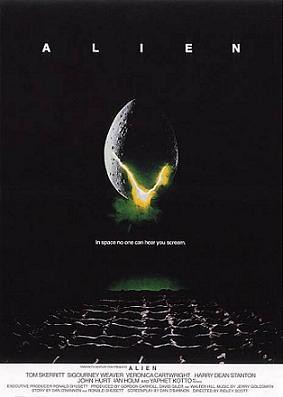Why does something matter? What context surrounds it that
makes it something to look more closely at? Here at Nerds, I recently pitched
an idea to the lovely Powers That Be that would allow me to explore different
influential pieces from SFF and horror. I wanted to look at specific episodes
of shows, short stories, novels, movies, that have had some lasting effect
whether it be to the genre, to pop culture, to different critical theories/lenses,
to fandoms, and so on, to try to get at Why THIS Matters. A note on these
posts: because I’ll be analyzing them from a variety of angles and contexts,
there will most likely be spoilers within for the pieces that I am talking
about. If you haven’t seen/read them and wish to, avoid the post and come back
later.
For this inaugural Why This Matters, I’ll be looking at the
film Alien. Why Alien for the first post, you may ask? Well, for one, it was one of
the main reasons I wanted to do this series of posts in the first place. For
two, it’s a damn good film. And for three, why not celebrate something with a
strong female lead?
Alien, which came
out in 1979, was written by Dan O’Bannon and directed by Ridley Scott. Which, let’s pause for a second for a WTF
moment (What the Filmmaker?!) to consider that Ridley Scott’s first three films
were: The Duellists, Alien, and Bladerunner. He made three perfect films
in a row. Let’s all applaud Scott for a second, and forget about certain later
films. Okay, moving on, the plot of the film is probably familiar to almost
anyone—even if they haven’t seen it (now would be a goodtime for me to shame a
friend of mine—who claims to like sci-fi—publicly, but I’m not going to,
because I’m above that). The Nostromo
is a commercial spaceship that goes to a planet, investigating a mysterious
signal, and ends up bringing back something very unwanted on to their ship. (There’s
probably a direct correlation between the number of times I watched Alien/Aliens as a child and my phobia of
parasites now, but I won’t linger on that.) The film then becomes basically a
sci-fi version of And Then There Were
None, as the crew members are picked off one-by-one. I once read, which has
to be something apocryphal, that the film was pitched as: “Jaws in a haunted
house in space.” And even if this is bogus, it actually serves as a pretty damn
fine pitch because who wouldn’t want to watch that?
So why is it important? What makes this film such an
enduring classic? There are many angles to take to answer this. From the
critical perspective of Monster Theory, the xenomorph in Alien is the ultimate depiction of “fear of the unknown.” It has
extremely limited screen time and is mostly seen as something barely glimpsed,
a blip on the screen that moves too fast. (This is something many contemporary horror
films would do well to consider: often the scariest monster is the one the
audience has in their head leading up to the reveal, not the one they actually
see on the screen. Knowing impedes dread.) From the perspective of its place in
SFF and film as a whole, it’s important for what it inspired. So many sci-fi
books and films can make a direct link back to Alien—whether in their filming, their pacing, or their depiction of
otherworldly horror. From the perspective of design alone, there are so many
things to point to in how Cobb, Foss, and particularly Giger influenced our
collective vision of space, spaceships, and alien lifeforms.
However, I’d like to make a different, more personal,
argument for the importance of Alien.
For me, one of the aspects of the film with the most impact lies in its protagonist—Ellen
Ripley (portrayed magnificently by Sigourney Weaver). The expectation of
filmgoers, particularly at this time, was that the hero of the film would be
the ship’s captain, Dallas (played by Tom Skerritt). However, it is Ripley—the only
voice of reason, as she tries to insist on protocol—who becomes our hero. And
what an interesting hero. Yes, she is tough, but she also shows fear—as anyone
in this situation would—and survives not because she kicks alien ass, but
rather because she thinks through the situation at hand (other than perhaps in
her saving of Jones—but who wouldn’t save that adorable cat?). She follows
protocol, uses rational thought to solve the problems at hand, and ultimately
is the only survivor because she used her brain rather than force. I mentioned
earlier that Alien (and its sequel Aliens) were two of the movies I watched
most growing up. Looking back, I can’t think of a better protagonist, to have
wanted to emulate. Ripley isn’t a “strong female character” (and doesn’t fall
into the traps that that particular trope so often falls into) she’s just a
strong character period.
